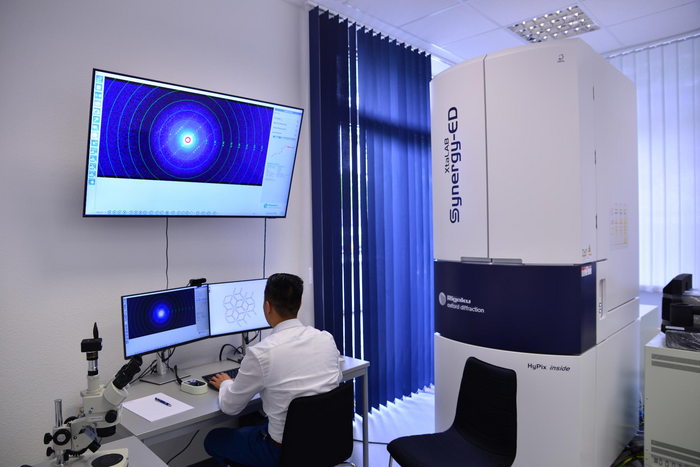A new centre based jointly at the University of Southampton and the University of Warwick will draw on expertise from two world class universities and become a game changer for chemical industries, including manufacturing, pharma and electronics.

Credit: University of Warwick
A new centre based jointly at the University of Southampton and the University of Warwick will draw on expertise from two world class universities and become a game changer for chemical industries, including manufacturing, pharma and electronics.
The National Electron Diffraction Facility, part of the National Crystallography Service (NCS), will be the first in the UK and the first national facility in the world. Using electrons, instead of conventional X-ray crystallography, scientists will be able to investigate and determine the structure of much smaller crystals than previously possible. This will enable the design of new and improved materials in several economically important areas including batteries, catalysts, energy storage materials, solar cells, pharmaceuticals and more, speeding up work on the green transition.
The new facility will feature two new XtaLAB Synergy-ED fully integrated electron diffractometers. This machine provides a seamless workflow from sample preparation, through data collection to structure determination of three-dimensional molecular structures from single nano crystals. The instruments will be housed in refurbished laboratories in Southampton and Warwick, which will also include sample preparation facilities and space for visiting researchers to work and integrate with the NCS team.
Thanks to a £3.2 million research grant from the Engineering and Physical Sciences Research Council, and supported by global market leader, Rigaku, the centre of excellence for electron diffraction will be open for academic and commercial partners in July 2023.
Simon Coles, Professor of Structural Chemistry and project lead for the University of Southampton site, said: “Historically, the NCS has really pushed the boundaries of what is possible by X-ray crystallography. In a tremendously exciting development, we will massively expand the technique through partnering with Warwick and Rigaku to create an integrated electron diffraction facility operating in a totally complimentary way with our world-leading national X-ray service.
“By using electrons rather than X-rays, this new facility takes us to a world where we can transform structural analysis by moving from studying microcrystals to now being able to get the same detailed information on nanocrystals.”
Dr David Walker is Facility Manager of the X-ray Diffraction Research Technology Platform and project lead at the University of Warwick. As a research technical professional, he led Warwick to success in such a prestigious award and was keen to ensure the facility provided posts for research technical professionals, who will provide the dedicated expertise to underpin the effective sharing of this ground-breaking technology. He said: “This exciting new instrument will enable us to study many crystalline materials that previously were difficult/impossible to grow into suitably sized crystals to be measured by the gold standard X-ray diffraction techniques. This will revolutionise our understanding of the structure of many economically important materials including pharmaceuticals, catalysts, batteries and energy storage materials leading to breakthroughs in these areas.”
Dr Mark Benson, General Manager, Global Sales and Marketing at Rigaku, said: “We are extremely proud to continue our long partnership with the UK National Crystallography Service. The NCS has been using Rigaku X-ray instruments for 13 years and will shortly be adding two of the world’s first dedicated electron diffractometer, the XtaLAB Synergy-ED, to their service at the universities of Southampton and Warwick. Our partnership will drive innovation and development in the rapidly growing field of electron diffraction.”




